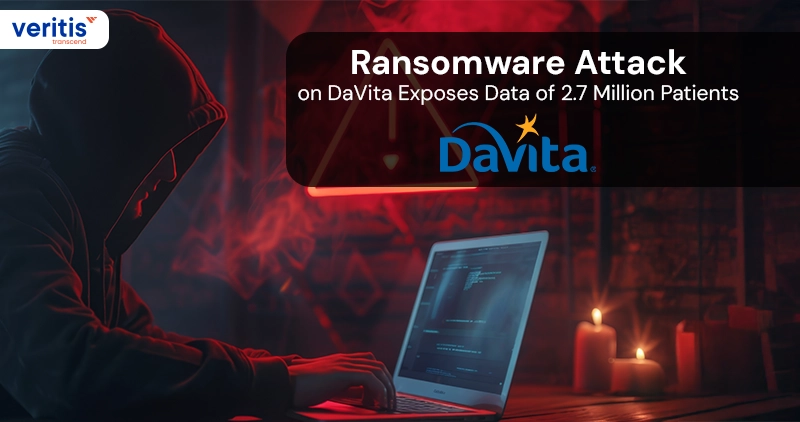
In one of the most significant healthcare breaches of 2025, DaVita Inc., a leading U.S. provider of kidney care, disclosed that a ransomware attack compromised the personal and medical data of nearly 2.7 million patients. The disclosure, posted on the U.S. Department of Health and Human Services (HHS) breach portal, has heightened concerns about the vulnerability of healthcare systems and underscored the critical need for proactive cybersecurity strategies.
At Veritis, we closely track incidents like these because they validate what we’ve long advised our healthcare partners: data security is now a direct extension of patient safety.
The Breach: What We Know
DaVita confirmed that attackers accessed names, dates of birth, contact details, and medical information, high value data that drives identity theft and insurance fraud schemes. The incident has triggered federal investigations and heightened scrutiny of HIPAA compliance, placing immense pressure on healthcare providers to strengthen their defenses against potential breaches.
Why is Healthcare a Top Target for Cyberattacks?
Ransomware thrives by exploiting phishing emails, weak credentials, and unpatched system vulnerabilities. Once inside, attackers encrypt systems and often exfiltrate sensitive data, adopting a “double extortion” model, demanding payment not only to restore access but also to prevent public data leaks.
Healthcare remains uniquely vulnerable because medical records are more valuable than financial data on underground markets. Unlike credit cards, personal health data cannot be easily replaced. This makes hospitals, dialysis centers, and patient care networks frequent and lucrative targets.
The Impact and Compliance Burden
For DaVita and others, the implications are enormous. Beyond reputational and operational damage, breaches like this expose organizations to severe regulatory penalties under HIPAA. Patient trust, once broken, is difficult to rebuild. This breach is another reminder that cybersecurity failures in healthcare have consequences far beyond IT; they directly impact care delivery and public confidence.
How Does Veritis Help Healthcare Leaders Stay Ahead?
As ransomware attacks escalate, healthcare executives are realizing that traditional perimeter defenses are no longer enough. At Veritis, we help organizations evolve toward a resilient, proactive security posture built on:
- Zero Trust Frameworks: Every access attempt is verified, eliminating implicit trust.
- 24/7 Security Operations Center (SOC) Monitoring: Constant vigilance and rapid incident response.
- Threat Detection and Vulnerability Management: Regular scanning and patching to close attack entry points.
- Managed Security Services: Leveraging Veritis’ deep expertise to strengthen defenses while optimizing costs.
By aligning people, process, and technology, Veritis ensures healthcare providers can detect threats faster, contain breaches sooner, and maintain compliance with confidence.
Conclusion
The ransomware attack on DaVita underscores a growing and persistent threat to healthcare organizations. Cybersecurity has evolved from a back office function to a frontline necessity, central to safeguarding patient trust, ensuring regulatory compliance, and maintaining uninterrupted operations. In 2025 and beyond, strategic investment in cyber resilience is crucial to the future of healthcare.
At Veritis, we believe the future of healthcare security lies in a layered defense strategy powered by AI driven detection, continuous monitoring, and a culture of security first thinking. Ultimately, protecting patients is not about treatment; it’s about safeguarding their trust, privacy, and future.
Additional Resources:
- Google Introduces Ironwood Chip for High-Speed AI Applications
- Hackers Exploit SharePoint Flaw in Major Global Cyberattack
- OpenAI Launches SearchGPT Prototype for Testing as New AI Search Engine
- DeepSeek AI – The Next Frontier in Artificial Intelligence Innovation
- Google Project Mariner, the AI Agent Redefining How You Navigate the Web